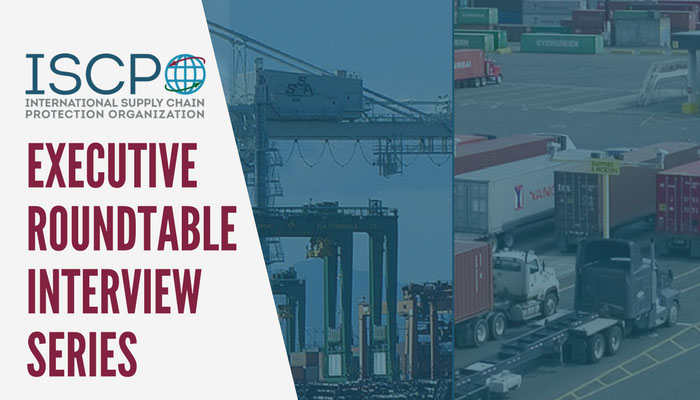As part of our Executive Roundtable Interview Series, we recently sat down with industry thought-leader Wes Bank to get his point of view on the challenges, trends, and developments facing the LP / AP industry. Wes also headed up ISCPO’s Carrier Security Audit Committee that developed a formal audit program to bring new security standards and risk management processes among carriers.
ISCPO: Pls share a short summary of your background and experience in supply chain protection.

I began my career catching shoplifters and maintaining store shrink programs for Jewel-Osco, which led to managing LP for some of their US based DCs before heading back out to the “field” to manage retail LP at the District level. After 10 years of grocery & pharmacy LP, I joined Office Depot as a Regional LP & Safety Manager for supply chain. Thinking I knew everything about Loss Prevention, I was in for a huge awakening. I had a tremendous boss named Bill Gavin who exposed his team to inventory control through WMS systems, adjustments and various cycle count methodologies. I was encouraged to participate in industry groups such as RILA and LPF. It was here that I participated on a content development committee for a new certification that we all know today as the LPQualified and LPCertified. During my tenure at Office Depot, we transitioned from in-house delivery drivers to 3rd party carriers which soon became ground zero for our battle against shrink and an important propellant into my current role.
After 12 years at Office Depot, I was hired by Velocity Express (a large final-mile provider with over 60 facilities across the US) to develop a Loss Prevention program to minimize customer cargo claims. Quite a demanding task considering the added challenge of not being able to coach, train or provide any direction for the thousands of independent contractors (drivers) handling our customer’s freight. One of my most demanding customers from a security compliance perspective was DHL Global Mail who had a very stringent program to follow. There was a mutual respect for their well-contrived security requirements and our compliance efforts.
It was a short crossing of the bridge when a vacancy opened at DHL for a Security Director, where I was hired as an individual contributor. Within 3 years I grew the department to 19 strong with the great support from my current boss, Nikki Koontz. During this evolution, I implemented a department name change from Security to Loss Prevention for better customer recognition and relevancy in the ECommerce world. Today, DHL’s LP department focuses on 4 core competencies: Investigation, Audit, Regulatory and Physical Security/Systems.
ISCPO: How has the industry evolved since you started out?
At the start of my career in 1990 tech consisted of pagers to communicate urgency, we didn’t have cell phones or any personal computing devices. Case reports and audits were handwritten. Analytics were big if defined as hand tallying data from a sea of filed manila folders. Retail shoplifting and employee theft apprehensions were of the greatest priority. We equipped ourselves with handcuffs and at times provided chase down the street without repercussions. Needless to say, we just don’t do this anymore today and pretty stupid even back then.
Laws and regulations (such as Tort, Labor laws, OSHA, DOT, Homeland Security and more) have been rapidly evolving requiring Loss Prevention practitioners to stay current through education, training and policy adoption all in the name of reducing exposure to liability. Yesterday’s techniques to influence loss/risk may be doing more harm than good today. Look at some current challenges in the news today with worker misclassification, security screening/waiting time, criminal background checks in hiring decisions, and privacy/retention of personal data.
Moving beyond bricks & mortar LP & Security
The nature or source of the losses or risk in Supply Chain is usually much different than those of retail brick and mortar. Therefore, the Loss Prevention programs must be unique to this part of the business in order to stay focused and relevant. A shipper, for instance, doesn’t have its own inventory valuation but is accountable to hundreds of clients. Losing a customer due to underperformance or continuing losses might be more financially devastating to the shipper than the product loss was to the client. Therefore, the focus for the shipper’s Loss Prevention department might be more about customer satisfaction/retention with KPIs to support that focus. A retailer’s modern supply chain might apply less value to case count, terminations and arrests than government regulatory compliance, insurance premium reductions, minimizing inventory inaccuracies and out of stocks, for example.
Supply chain and e-commerce are the new drivers of our industry as businesses try to gain further efficiencies in order to minimize costs and grow earnings. I like to think of store merchandising as an art while supply chain as a science. Industrial Engineers and Operators work hard to measure productivity and quality or what I describe as “today’s costs” within the supply chain. It is today’s costs that are greatly considered when setting up and creating operating plans in the DCs. Risk/loss is “tomorrow’s cost.” Therefore, Loss Prevention needs to have a seat at the planning table to help influence or prevent these future costs. While a shrinkage problem in a particular store is concerning at the local level, a significant loss or two within the supply chain can cripple earnings enough to instill panic within the organization or even influence investors.
ISCPO: What are the biggest challenges to supply chain protection & security, from a holistic industry level?
Whether you are shipping internally to replenish your shelves or shipping externally to an end user (B2B, B2C), securing the supply chain has never been more important for the success and longevity of the company.
Speed
The largest ECommerce player(s) are setting the expectations or norm for end users with respect to the speed of delivery, the cost of delivery and tracking advancements. ECommerce competitors work hard to keep pace, while the revenue squeeze is put on many brick & mortar stores. This competition inspires innovation and technology advancements within everyone’s supply chain. It may also help spur new businesses that can provide services to aid your supply chain at lower costs. The shipper that can deliver in the shortest time, with the best tracking and at the lowest cost will win. This not only ensures continuous investments into supply chains but also the need to maintain a lean/efficient operation.
Regulatory compliance
There are many government agencies that are entwined within most supply chains in the name of safety or security. The challenge is to maintain regulatory compliance through training, audit and investigation programs which all add front loaded costs. However, failure to front load these costs appropriately in your business today will likely cost 2, 3, even 4x more in tomorrow’s costs.
Technology
Technology isn’t as simple as it was 20 years ago. Today, Loss Prevention professionals must be able to control travel expense by monitoring compliance or investigating remotely at times instead of onsite visits. Cameras, alarms, card access, analytics, audits, etc… must be manageable through key strokes, not footsteps. Back in the day, only LP procured their systems and project managed the installations. Today, more and more IT departments are tasked with providing the solution for anything placed onto the network such as cameras, card readers. Don’t shun this idea. By providing the solution, IT departments are also responsible for the quality of service and managing service providers. This frees up the Loss Prevention team to establish the system requirements and write policy on usage, auditing, and reporting. This is really about working within your core competency, allowing each cross functional group to do what they do best.
ISCPO: Why do you participate on the ISCPO as a Committee Member?
I was always interested in leveraging our industry colleagues to develop industry standards for the Carriers and the ISCPO was the perfect conduit to get the message out. I joined in its inaugural year and, at the first conference, I surveyed the audience and determined that there was interest in developing a standardized carrier audit and sharing results among members. This concept helped launch the ISCPO Carrier Security Audit Committee. At the second conference, I presented on Final Mile Carriers, how they operate and the challenges as it relates to their clients. This set the stage for the committee’s first order of business, establishing a set of Carrier Security standards and audit. Later, the committee created a carrier certification process. Carrier Certification is very beneficial from the client’s perspective in knowing that industry security standards are applied to their extended supply chain but also a tremendous marketing value for the carrier. We expect to be sending more qualified carriers through the certification process in the next 12 months.
The ISCPO is gaining momentum as colleagues really need to network directly with other Supply Chain experts, without wasting lots of time through networking via less direct channels. The ISCPO is attracting more Carrier-employed Loss Prevention professionals and that helps bridge the gap of understanding between the contracted and the contractee. Supply Chain is very different than retail so this outlet provides the networking, round-table discussions, and support needed to arm LP or Security practitioner with the right strategy.

